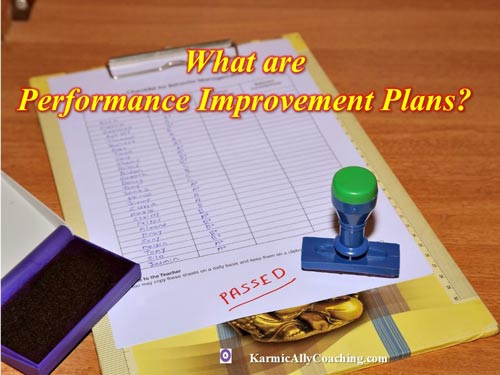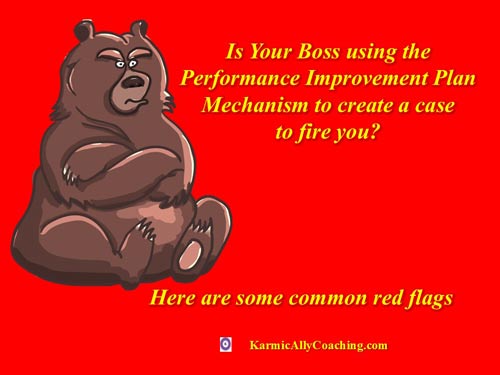This post has already been read 3201 times!

It’s that moment when you know something is wrong but aren’t sure what.
Your boss has called you into his office and he is wearing a serious look. That part is fine but there is another person also present. You realize something is going to happen for which the boss wants a ‘witness’.
The conversation starts with a few niceties while you wonder what the agenda is and then the bomb drops on you. The company isn’t happy with your performances and instances are cited.
You’re not given a chance to explain and the attack continues on you as if to bait you into an unprofessional outburst.
Don’t worry, you’re not going to be fired on the spot unless you’ve done some dismissible offence. Instead, you’re told something that is bound to rattle you, especially if it is unfair – a Performance Improvement Plan (PIP).
It’s not uncommon for employers to use a PIP as a first step to fire an employee and later in this post I’ll share some red flags with you but for now, know that you do have the power to improve your performance and keep your job.
I remember in my corporate world days we used to have a bell-curve approach to performance reviews. 1 meant you were out, getting a 2 provided the opportunity to improve your performance to a 3 (which meant you were performing as expected for your grade and job role). 4 or even a 5 meant promotion time.
What are Performance Improvement Plans?

A Performance Improvement Plan or PIP is a structured document containing the plan of action designed by the supervisor for an employee whose performance is not up to the mark.
The plan might be created as a result of an unsatisfactory performance review, to eliminate an unwanted behavior that is affecting performance or even as a second chance to an employee who is on the verge of being terminated. That was why getting a 2 on the bell-curve put the employee on a PIP.
Normally your boss and HR will meet with you to discuss the PIP and answer any questions that you have. A good PIP will include giving you support to meet the set goals or Key Performance Indices.
Think of it this way, when you start a new job, you’re put on probation for a specified period of time which could range from 6 weeks to 3 months or even more. If you meet the job requirements and your performance is up to par, you’re confirmed in your job.
This is similar except it’s done while you’re already on confirmed employment. If you’re not able to improve your performance during this period or don’t meet the agreed targets, then yes, you’re employment is terminated.
How to handle a PIP
Don’t take a PIP the wrong way and hand in your resignation because you’re upset.
Instead, discuss the PIP thoroughly with your boss and HR and clarify the goals and how you will be assessed.
Be professional and ask for support. If you’re employer’s intention is to fire you, they wouldn’t put you on a PIP to start with.
I’d suggest setting up a check-in schedule with your boss or a designated colleague so you can course correct as soon as possible and also monitor your progress.
This will demonstrate you’re taking the PIP seriously and also demonstrate your confidence to achieve the required targets.
If you feel you need morale support or more guidance, talk to more successful colleagues about how they do it. Better yet, hire a coach for the period of the PIP who has the experience to guide and support you.
Keep your eyes focused on the goal. When you do achieve it, you’ll have done more than just meet the requirements to keep your job.
You’ll have demonstrated that you are mature enough to acknowledge that there is a deficiency in your performance. That you are also a professional who is willing to overcome shortcomings and emerge successful.
It’s another thing that you might want to quit your job after successfully completing your PIP.
That is your call. Especially if the period of the PIP has led to professional growth and you realize you want to explore new pastures instead of continuing with the employer.
So this is the happy ending but what if your gut feeling is that the PIP is a step to get rid of you?
Signs the PIP is being imposed to fire You
It’s not uncommon for some companies to use the PIP to create a situation where they can fire you at the end of it and avoid any legal hassles.

Some common signs include:
- You’re being targeted by your boss who is making it difficult for you to work by not giving you the required resources or criticizing you
- You are being overworked or given unreasonable tasks
- You’re being baited into a conflict which could take the form of embarrassing you in front of your colleagues or giving credit for your work to someone else
- You are being assigned tasks that don’t fit your competency level. This can one of 2 forms – either the task is below your level or tasks that are too difficult and guarantee your failing.
- Your boss tries to micromanage you and doesn’t give you the space to do your work and indulges in formal channels of communication via email instead of communicating with you directly in person or on the phone
- You’re bypassed for promotions and given lame excuses about where you’re lacking without a chance to defend yourself
- Your boss is giving more credibility to colleagues who engage in dirty office politics without hearing your side of incidents
These are just some examples but you get the general idea.
What’s your plan?
You’ll have the indicators during the PIP planning itself. Especially if you’ve got a history with the boss which isn’t cordial or you’re presently facing workplace harassment. It could be goals being set without the support to achieve them.
In my post on the topic of workplace harassment, I’ve given tips on how you should approach it including checking your company’s policies.
If that is the case, then you need to work out your strategy properly. I would recommend agreeing to the PIP but using that time to update your resume and LinkedIn profile and getting into job search mode.
Once both documents are updated, tap into your network and also apply for jobs that are suited to your qualifications.
Be wary of sneaky colleagues who might try to derail you and play positive politics if you have to play at all.
You might get lucky and have an offer before your PIP is completed and the employer might just give you a good reference because they’re relieved your leaving on your own.
Have you ever been placed on a Performance Improvement Plan or something similar? How did you handle it?




 I adhere to the Certified Coaches Alliance Code of Ethics and Standards. A copy is available on request.
I adhere to the Certified Coaches Alliance Code of Ethics and Standards. A copy is available on request.
 Let's Talk through the Connect Form:
Let's Talk through the Connect Form:
So glad I don’t work for the corporate world or for anyone but myself. Thank you for posting the information, I’m sure it is important and helpful to others.
This can happen anywhere, Heather, even in educational institutions and private firms. I agree its helpful to have the information in case someone you know needs it.
Went through that back before I retired. Wish I would have had this wisdom then!
So sorry you have experienced this, Barbara. It can be very stressful if not tackled properly.
I read this post with interest because I realise somethings would have been different if I knew this before.
But am glad I learnt how to better manage PIP related conflict situations.
Thank you Vatsala
My pleasure, Leila. Knowledge helps when faced with such situations and the outcome can be very different too.
This stuff is why I can’t work for Big Corporations. Thank you for sharing this
Welcome Laura. Sadly this is the kind of stuff that can happen anywhere.
Vatsala, Thanks for sharing your wisdom regarding Performance Improvement Plans and how to deal with them. I haven’t had to face this but know someone close to me who faced a similar situation within the last year. In that case I helped them craft an email with evidence in response to the written feedback he was given. Fortunately they still are in their job and doing well.
Thank you for sharing your experience, Pamela. Your friend was fortunate to have you there to help them craft the response email as demonstrating evidence of performance is crucial in such cases.
I’m either lucky or naive — but while working in corporate (or government) environments, I had mentors and supervisors who wanted me to succeed. I’ve used PiPs with employees, but, for the most part, wanted their performance to improve.
Thank you for sharing your experience and also validating that PIPs are not always a negative thing but might help the employee do better, Andrea.
Vatsala, I read this post with interest since someone close to me is experiencing a PIP in their company. How unbelievably stressful this process must be! I particularly like your suggestion of setting up check-in appointments with the supervisor. It’s empowering and proactive in a situation where you’ve been put on your heels. Great post!
Thanks Melissa. PIPs aren’t fun for the person having to prove their worth to the employer especially if the boss is out to ‘get them’. Hopefully now that you know what happens, you’ll be better able to support the person who is going through this right now and understand their mental condition.